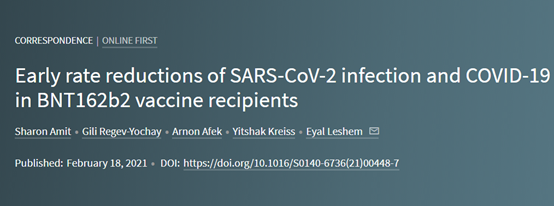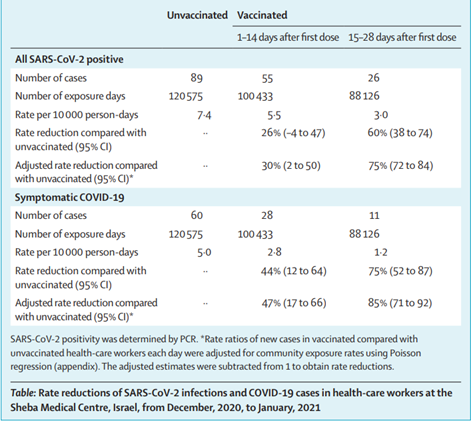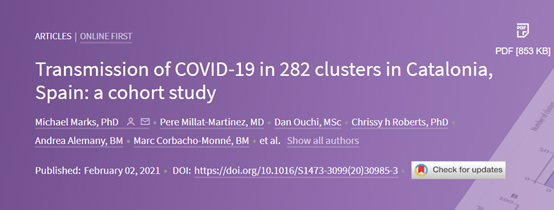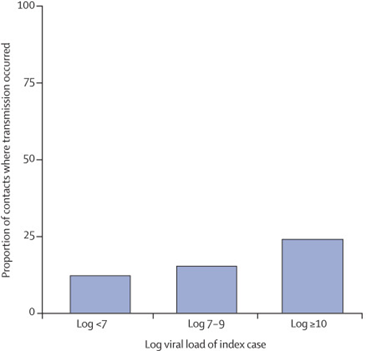Lancet: Pfizer COVID-19 vaccine can indeed control the epidemic
- Normal Liver Cells Found to Promote Cancer Metastasis to the Liver
- Nearly 80% Complete Remission: Breakthrough in ADC Anti-Tumor Treatment
- Vaccination Against Common Diseases May Prevent Dementia!
- New Alzheimer’s Disease (AD) Diagnosis and Staging Criteria
- Breakthrough in Alzheimer’s Disease: New Nasal Spray Halts Cognitive Decline by Targeting Toxic Protein
- Can the Tap Water at the Paris Olympics be Drunk Directly?
Lancet: Pfizer COVID-19 vaccine can indeed control the epidemic
Lancet: Pfizer COVID-19 vaccine can indeed control the epidemic, and the infection rate in the 4-week population drops by 75%.
The COVID-19 virus has been circulating all over the world for more than a year. Although China has basically controlled the epidemic through various measures, the COVID-19 virus still affects our lives: we still need to wear masks when traveling, take temperature measurements at subway stations, and scan health codes. , Return home during the Spring Festival for nucleic acid testing, etc. When will our lives return to normal? No one can answer this question definitively, but vaccines are definitely a necessary means to push human life toward the peace of the past. This is not only historical experience, but also confirmed in recent studies.
Protect the vaccinated population and reduce the virus infection rate
Recently, scientists from Israel published an article entitled “Early rate reductions of SARS-CoV-2 infection and COVID-19 in BNT162b2 vaccine recipients (BNT162b2 vaccine recipients SARS- CoV-2 infection and the early reduction rate of 2019 coronavirus disease)” article, the data in the article shows that vaccination with Pfizer’s mRNA new coronavirus vaccine BNT162b2 does help reduce the infection rate of the new coronavirus.

In December 2020, the Israeli government approved the COVID-19 vaccine developed by Pfizer to be vaccinated nationwide. Like most countries, the Israeli government advocates that medical staff should be the first to vaccinate.
In order to evaluate the protection efficiency of the COVID-19 vaccine, the researchers conducted a retrospective cohort analysis of 9,109 medical staff, and compared the vaccinated and unvaccinated infections.
As of January 24, 2021, of these medical staff, 7,214 (79%) received the first dose of vaccine (Pfizer vaccine requires two doses), and 6,037 (66%) received the second dose, of which 5505 One (91%) fully vaccinated medical staff received the second vaccination on the 22nd or 21st day after the first vaccination. Between December 19, 2020 and January 24, 2021, there were a total of 170 cases of new coronavirus infections among medical staff, of which 89 (52%) were not vaccinated and 78 (46%) were after the first vaccination Tested positive for the new coronavirus, and 3 people (2%) were positive after the second vaccination.
Among medical staff who have not been vaccinated, the infection rate of the new coronavirus is 7.4/10000, and the infection rate of the COVID-19 virus is 5.5/10000 and 3.0/10000 1 to 14 days and 15 to 28 days after the first vaccination. After the adjustment, the infection rate of the new coronavirus has dropped by 30% and 75% respectively.
Among the infected people, the unvaccinated group had a symptomatic neocoronavirus infection rate of 5.0/10000, while on the 1st to 14th and 15th to 28th days after the first vaccination, the symptomatic neocoronavirus infection was The rates dropped by 47% and 85% respectively.

Cut off the source of infection and reduce the infectivity of the virus
We all know that even if the protection of mRNA vaccines developed by Pfizer and Moderna is far ahead, reaching more than 90%, there are still a small number of people who are still infected with the new coronavirus even if they are vaccinated. But the vaccine can control the epidemic not only because it can reduce the infection rate of the disease, but also because it can reduce the infectiousness of the infected person and reduce the spread of the disease.
The COVID-19 virus is extremely contagious, which is also the main reason for the large-scale epidemic of the COVID-19 virus. People infected with the COVID-19 virus can spread the virus to others. During the epidemic, many sensational “super spreaders” have also appeared. There is no clear definition of how many people are super spreaders, but it is certain that the probability of these spreaders spreading the virus is much higher than the average number of spreads 2~3.
The contact tracing investigation in the early stage of the epidemic in China estimated that about 10% of the cases caused 80% of the secondary transmission, so super spreaders played a very important role in the spread of the epidemic.
A few days ago, the China Centers for Disease Control and Prevention Weekly reported a case of a super-spreading incident that occurred in Tonghua, Jilin. The super-spreader in the incident was a 44-year-old man who traveled between Changchun and Tonghua to carry out product marketing and promotion activities. , A total of 145 people participated, of which 141 were infected.
Therefore, if it is possible to cut off the virus-infected population and spread the virus out, it is of great significance to control the epidemic.
Another article, Transmission of COVID-19 in 282 clusters in Catalonia, Spain: a cohort study, published in The Lancet Infectious Diseases, shows that the infectivity of patients with the new coronavirus is related to their viral load.

The higher the viral load, the higher the probability of spreading the virus to people in close contact with it: when the viral load is less than 1×106/mL, the probability of a contact transmission event is 12%, and when the viral load is At 1×1010/mL or higher, the risk of transmission increases to 24%.

According to Nature, in a preliminary study, a research team observed that within two to four weeks after receiving the first dose of Pfizer vaccine, some people in the vaccinated population were unfortunately infected with the virus, but their viral load was higher than that after vaccination.
The number of people infected with the virus has dropped significantly within two weeks, which means that although the COVID-19 vaccine has not produced very effective immune protection for these people, it has effectively reduced their ability to spread the disease. In the vaccination test jointly developed by Oxford University and AstraZeneca, a similar phenomenon was observed. Compared with unvaccinated people, the viral load of vaccinated infected people had a greater reduction.
To sum up, it is very necessary to get the COVID-19 vaccine. The vaccine can not only protect the vaccinated people from the virus infection, but also reduce the spread of the virus infected people. I believe that when the vaccine is popularized to a certain extent, we will be able to return to normal life.
(source:internet, reference only)
Disclaimer of medicaltrend.org



